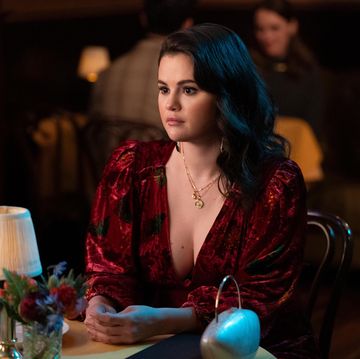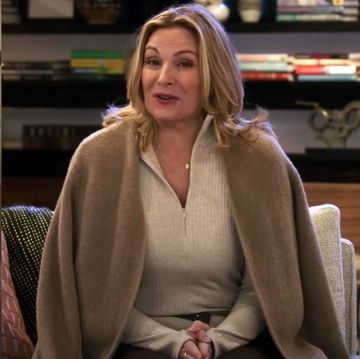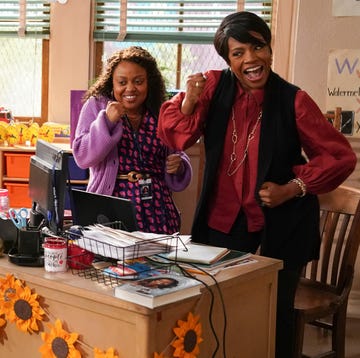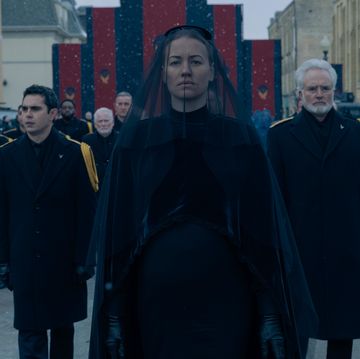Serena Joy is one of the great anti-feminist villains. Even for Margaret Atwood, an author who's been known to expound at length on her love of wicked female characters—"women," as she says, "have more to them than virtue"—the chief female antagonist of The Handmaid's Tale is singularly disturbing. She's an enemy, not of any particular woman, but of women as a whole. She is a true believer in the patriarchy, a woman who made a high-profile career out of arguing that women shouldn't have high-profile careers; she created the forced-birth hellscape of Gilead and then got trapped there, relegated to the role of decorative, insignificant housewife at the very moment she proved herself capable of running the world.
This much is true whether we're talking about Margaret Atwood's 1985 novel or Hulu's 2017 adaptation. But somewhere in the transition between mediums and decades, almost every other detail has changed. Where Serena Joy used to be a blunt, sobering portrait of religious zealotry, she's now symbolizes an even greater threat—that our oppressors have gotten smart enough to sell us poison in an on-trend, very blonde package. In 2017, anti-feminists have co-opted feminist rhetoric in a way that would have been unimaginable in 1985—and we need to be more canny than ever about the mismatch between style and substance if we are to take it back.
Today's episode of Hulu's The Handmaid's Tale, "A Woman's Place," dives headfirst into that disjoint, giving us an entire episode centered around Serena Joy (Yvonne Strahovski)—including flashbacks to her life before the revolution. The surprise: She's almost relatable. Serena Joy was once in a loving relationship with Fred Waterford (Joseph Fiennes), better known to us as the Scrabble-loving rapist Commander. Yes, the two of them recited Bible verses about fruitfulness during sex, but people get up to all kinds of odd things during sex; it's why you look for thick walls in an apartment building. Stranger than their Bible fetish is the fact that their marriage was once remarkably egalitarian. Both worked in and around politics; both were passionate about the same causes. You get the sense that Serena is the brains of the operation, and Fred hardly holds her back. When she tells him about a big idea she's had for a new book, he's supportive, and when their male colleagues shut her out of important discussions, he promises to fight for her. At a glance, the whole thing looks...healthy.
Yet this modern-looking, aspirational marriage is a vehicle for turning America back to the 1700s. Serena's book idea concerns "fertility as a national resource, reproduction as a moral imperative." (She never got the chance to write it; the very people she empowered made it illegal for women to read shortly after she got the idea.) Her first book, A Woman's Place, extolled the power of being submissive and accommodating to men and accused women of "abandoning their families." It established her as a voice on the forefront of what she called "domestic feminism." Chillingly, Serena Joy tried to sell the world on a return to total male domination by making the patriarchy look progressive—and she got what she wanted.
In 1985, Serena Joy didn't look quite so savvy. She was several decades older than Offred, a conservative televangelist who rose through the ranks, from choir member to star of the show; she is, among other things, a very mean portrait of Tammy Faye Bakker, who became a camp icon, thanks to her on-screen meltdowns and running mascara. And though Offred is disquieted by her intensity, the rest of the world sees her as a joke: "Luke and I would watch her sometimes on the late night news," Offred recalls. "Bathrobes, nightcaps. We'd watch her sprayed hair and her hysteria, and the tears she could still produce at will, and the mascara blackening her cheeks… We thought she was funny. Or Luke thought she was funny. I only pretended to think so. Really she was a little frightening."
Offred goes on to point out her hypocritical politics: "Her speeches were about the sanctity of the home, how women should stay at home," Offred says. "Serena Joy herself didn't do this, she made speeches instead"—which mirrors pretty much every feminist criticism of Phyllis Schlafly, a constitutional lawyer who advertised herself as a "housewife" in her successful campaign to defeat the Equal Rights Amendment. You can also find a little of Margaret Thatcher in Serena's Iron Lady affect, if you squint.
The original Serena Joy, in other words, embodied what anti-feminism looked when The Handmaid's Tale was published 30 years ago: middle-aged, stodgy, and openly conservative. The women on whom Serena Joy were likely modeled would never have described themselves as "domestic feminists," because they would never have described themselves as feminists, period; the concept was still new enough, and controversial enough, that they could reject it categorically.
But anti-feminism has since taken on a different cast, and it wears a new face. If conservative women still looked like that Serena Joy, young women would be able to see them coming; we'd quickly discern their agenda, realize the threat they posed, and stop listening. That's why the standard anti-feminist model today is not to attack, but to co-opt. Instead of arguing that women ought to be stripped of rights for "moral" reasons, conservatives increasingly argue that giving away those rights is empowering.
Ever since critic Rachel Vorona Cote noticed the physical resemblance between Strahovski and you-know-who, it's become common practice to compare Serena Joy to Ivanka Trump. Even Strahovski herself has joined in. These comparisons are all but irresistible; there are only so many thin, pretty, patrician-looking blonde women who work with their husbands in conservative politics and have recently published terrible books about feminism. Yet Ivanka's tissue-thin, market-researched glaze of femin-ish thought—appliquéing whichever #inspirational quotes and talking points her marketers have dreamed up in what is ultimately a highly traditional portrait of the white nuclear family and the joys of motherhood—is only one dimension of a much wider and more troubling phenomenon: the creeping sense that feminism, expertly brandished, gives anti-women activists a kind of cultural cover.
Serena Joy gives us "domestic feminism," but the very real Christina Hoff Sommers preaches "equity feminism" while Camille Paglia endorses "pro-sex feminism" and Kellyanne Conway sees herself as a practitioner of "conservative feminism," which—since Sommers thinks society is prejudiced against men, Paglia thinks accounts of campus rape are "wildly overblown," and Conway works for Donald Trump—are actually all phrases that mean "not feminism." Nor is the appropriation confined to the word alone. Slate has reported on a whole wave of "pro-life feminists,"—young, quasi-secular, rainbow-haired anti-choice activists who rail against contraception by pinning it on "'douchebags' who 'treat fertility like a disease' by expecting their partners to be on chemical birth control." Like Serena Joy, who packages lessons on feminine submissiveness in empowering language—"never mistake a woman's meekness for weakness," runs one line—these groups know how to ape the style of social-justice arguments.
This co-option is so pervasive that modern Serena Joys can approach, disconcertingly, from the left as well as the right: She might be a "pro-life socialist" who cautions you not to prioritize "social issues" over "economics." (They're the same thing.) She might be Janet Robert of Democrats for Life, claiming that her anti-choice views have caused her to be victimized by the Democratic Party, and trying to rile up your feminist outrage by telling you that "abortion activists claim… that women are too weak to succeed without abortion." Or, she might just be your female friend who accuses other women of playing "identity politics" when they complain about any of the above. Whenever a woman's chief political praxis is destroying other women, or elevating herself by aligning with those who aim to roll back women's progress, Serena Joy is in the room.
But the true terror of 2017's Serena Joy is that she's someone you might not have seen coming. The game of advancing controversial agendas by wrapping them in appealing packaging is not new; consider the so-called "alt-right," and how it's managed to sneak Nazism back into the mainstream by covering it in Internet memes and selling it as a youth aesthetic. A modern-day Serena Joy would be far more like the young, modern, relatable "feminist" in the TV series than she would be like the forbidding middle-aged zealot in the book. As in the notorious case of the "Ivanka Voter"—white, suburban women so enraptured with Ivanka Trump's poise that they managed to vote in a man who'd confessed to sexual assault—she may be such an aspirational example that she manages to make women forsake or forget their own interests. To resist the rise of the new Serena Joy, we must examine her arguments more closely than ever, weigh up exactly what women are required to give up under the terms of her "feminism," and discover whether any real support for women's lives and freedoms rests under that tastefully branded, perfectly modern-looking facade.















